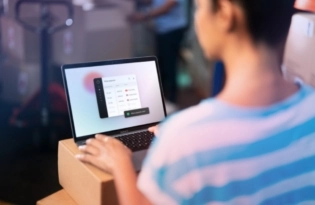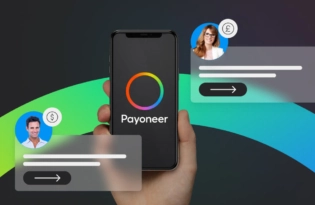How to Open a US Bank Account Online for Your Business
Opening a US bank account for foreign businesses is challenging but necessary for conducting business with US customers or suppliers. This guide covers requirements and alternatives, such as global payment platforms to simplify your business operations in the US

If you are looking to conduct business with either customers or suppliers in the US, you will need a convenient way to receive money from your buyers, and to pay for goods or services that you may buy in the US. As an individual or a small company located outside the US, the traditional solution is to establish a business checking account in a US bank.
Through your US bank account, you can pay your US suppliers via check or by wire transfer. Likewise, your US customers and clients can pay you by check, by direct deposit or by wire transfer into your US bank account. You can move money into, or out of, your US bank via international wire transfer through your local bank in your home country.
The difficult part for most small businesses is actually establishing that bank account in the US.(There are also simpler options, such as global payment platforms, that do not require you to establish a US bank account or perform conventional wire transfers. More about those alternatives below.)
What is Needed to Open a US Virtual Bank Account for Your Business?
It’s important to understand that the US has recently passed laws that place strict controls on how — and if — US banks can establish accounts for non-residents and for businesses located outside the country. This is designed to prevent money laundering and other international criminal activity.
In addition, individual states often have their own banking regulations that may affect the requirements for opening business accounts for foreign companies. And these regulations can vary widely from State to State.
Further, most commercial banks will have internal policies that govern how they handle accounts from overseas customers — both to comply with law, and to protect the bank against potential fraud or other possible losses. These policies may also be different in each bank.
The best approach is to directly contact the bank in the State where you will be opening the account and ask about their policies and procedures. But here are the general requirements:
You must open the account in person
With few exceptions, you will need to visit the bank in the US where you wish to open the account. This is required to verify your identity, and to allow the bank to validate the documents and information needed to open your account. You will need an official photo ID, proof of home address, bank statements from your home country bank, and perhaps other verification. Ask the bank for details.
Your business must be registered in the United States
To open a business account, you will need to register as a business in one of the 50 States, preferably where you will be doing most of your business. This applies whether you are a single person or a small company. The required documents will vary depending on whether you register as a sole proprietorship, an LLC, a corporation or other business structure recognized in the US. Ask the bank for their actual requirements. You may need to arrange with a US attorney in advance to legally establish a US-based business entity.
You will need a physical US business address
You will not necessarily need a warehouse, factory, or office in the US, but you must still provide an actual address (not a Post Office Box) for your US-registered business, preferably near the bank where you are opening the account. Some businesses use the offices of an attorney, a Registered Agent, or other specified representative of the company. You will need to set up these arrangements before opening the account, and verify that the bank will accept them.
You will need a US tax identification number
For most businesses, this will be an Employer Identification Number — an EIN — which is required by the bank, and your business, for reporting information to the US federal tax authority, the Internal Revenue Service (IRS). You can obtain this number directly from the website irs.gov, along with written confirmation of your EIN, which you must provide to the bank when opening the account.
When opening the account, you must usually complete a W-8Ben form for the IRS, which is needed for non-residents who don’t have US Social Security numbers.
Which US Banks Should You Contact?
Here are some of the largest banks in the US, which have local offices across the country. With many locations to choose from, it will be easier to find a bank near where you intend to do business in the US. And larger banks may be more experienced in opening accounts for foreign businesses.
- Citibank
- Chase Bank
- Wells Fargo
- Bank of America
- PNC Bank
- TD Bank
Simpler Options to Consider
If you have already have an account with a large international bank that also has banking operations in the US, they may be able to help you establish an account in the US, depending on the nature of your existing relationship with the bank.
There are also firms, based in the US, who offer services to foreign companies looking to open US bank accounts. Their fees and services vary widely.
Perhaps the simplest option for freelancers, online sellers and businesses outside the US are global payment platforms such as Payoneer, which can save you the colossal hassle of opening a US bank account, but still provide you with all the benefits of having one.
| US Bank Account | Payoneer | |
|---|---|---|
| Application | In person, in the US | Online |
| Financial Information | US business registration US W-8BEN US business address US tax ID (EIN) Business documentation | Name, contact info, local bank account information* |
| Documentation needed at registration | Your interaction with our websites. Other information collected through Cookies and other tracking technologies as listed above and as described in our “Cookies Policy” | From you directly and our third party analytic tools and cookies usage (See our “Cookies Policy” for more information). |
| Fees | Monthly account fee Wire transfer fees | Per transaction |
| Setup time | 3-10 days | Same day |
* Occasionally, additional identification or bank account documentation may be required.
With Payoneer you can get access to multi-currency accounts so you can get paid in popular currencies like USD, GBP, EUR, and more as if you were a local. You receive payments directly to your Payoneer account just as easily as if you had opened an international account, but with far less hassle. Once you’ve received payments, you can withdraw your funds from your Payoneer account to your local bank account in your own currency or use them in a host of other ways. This way, you can receive global payments just as easily as you would locally, saving you and your clients the time, effort, and cost of a global bank transfer.
For marketplace sellers, such as those who sell on Amazon.com, your local US receiving account is a very simple and secure way to receive your payments.
Payoneer provides a fast payment path between buyer and seller, across borders and currencies, with relatively simple setup, entirely online.
Both buyers and sellers can register themselves on the service quickly in some 200 countries worldwide, and be exchanging in a matter of days — for far less than the wire transfer fees charged by conventional banks.
Related resources
Latest articles
-
Made in India for the World: The State of Indian Cross-Border eCommerce
The Indian eCommerce market has grown significantly in the last few years. As a result, many cross-border businesses have undergone a fast-paced digital transformation and contributed to surpassing the government-set $400 billion target of trade within a single year.
-
Defying the odds: How Ukrainian businesses thrive during war
One year post-war, Ukraine’s businesses adapt and thrive amidst adversity. Entrepreneurs showcase resilience, reflecting national tenacity. Many diversify, venturing into e-commerce and digital realms. Despite hurdles, 44% of SMBs aim for growth, with 36% hiring. Their grit underscores Ukraine’s enduring spirit amid challenges.
-
An 8-point Checklist for Finding the Best Payment Provider
There’s huge potential to expand into ASEAN markets. But only for online sellers that accept local payment methods. Finding a trusted payment solution can be a worry and a challenge. Use this checklist to vet potential payment partners. With the right payment support, the sky’s the limit!
-
How to bill your international clients
Want to learn how to bill international clients when you’re based in the Philippines? In this article we spoke to three leading business owners who shared their tips to working successful international work. Learn how they collect payments and more below.
-
How to nail your direct-to-consumer payment strategy
Asia-Pacific offers massive potential for DTC ecommerce. But cross-border payments can be a headache. We share an actionable strategy for DTC payments that’ll remove DTC payment hazards and expand your business with ease. What are you waiting for?
-
How to pay international vendors in order to promote profits and reduce risk
In this article, we’ll share our expert tips and best practices for paying international vendors, so you can focus on growing your business. From choosing the right payment method to navigating currency exchange, we’ve got you covered.














